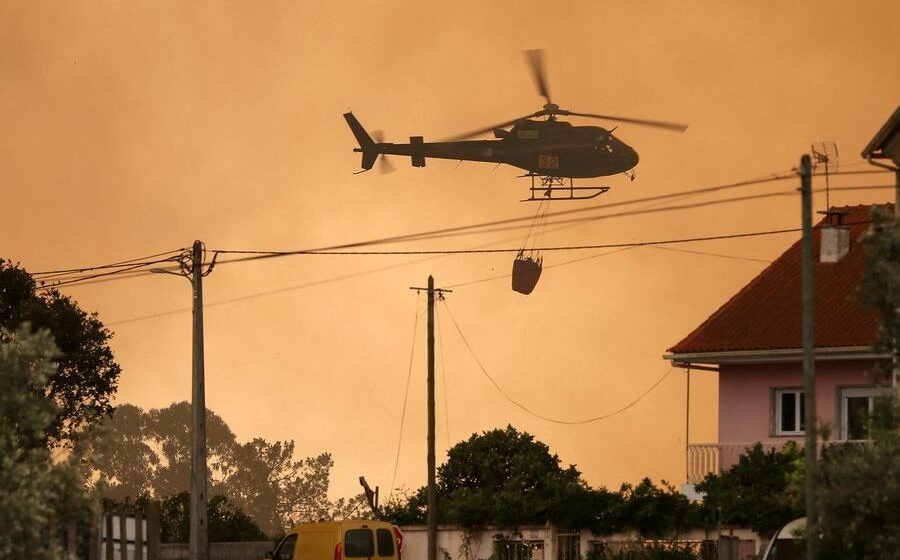Raging wildfires have scorched thousands of hectares of forest in France and Spain, while Britain is set to face its hottest day on record amid a searing heat wave.
The southwestern region of Gironde in France has seen the worst of the blazes so far.
A total 14,300 hectares (35,000 acres) of land have been burned as of Monday, with 24,000 people evacuated from the region, the Nouvelle-Aquitaine and Gironde prefecture said on Twitter.
The heat wave in Portugal has intensified a pre-existing drought and sparked wildfires in central parts of the country, including in the village of Memoria, in the Leiria municipality.
Authorities have deployed 1,700 firefighters to tackle the fires. A spokesperson for the Gironde regional fire and rescue service said 12 firefighters have sustained minor injuries since the start of the operation.
In Spain, wildfires engulfed the central region of Castile and Léon and the northern region of Galicia Sunday, Reuters reported. Firefighters steadied the flames in Mijas in the southeastern Málaga province and said evacuated people could return home.
Sweltering temperatures in Portugal have exacerbated a drought that started before the heat wave, according to data from the national meteorological institute.
About 96% of the mainland was already suffering severe or extreme drought at the end of June.
More than 1,000 people have already died in the ongoing heatwave in southern Europe.
On Saturday, Portugal’s Health Ministry said 659 mainly elderly people had died in the previous seven days. Spain had recorded 360 heat-related deaths, according to figures from the Carlos III Health Institute.
An elderly couple also died Monday while trying to drive away from wildfires in northern Portugal, after their vehicle overturned, the country’s state broadcaster RTP reported.
‘Peak of intensity’
The blistering heat wave in Western Europe is expected to peak early this week.
Monthly minimum temperature records could be broken across France Monday, according to the national weather agency. Météo-France identified nine localities where the monthly minimums look set to be broken, including Rostrenen in Brittany, northwestern France, where the record has stood since 1968.
In addition to Gironde, Météo-France issued a heatwave red alert to a total of 15 departments in western and southwestern regions, as temperatures are expected to reach as high as 42 degrees Celsius (108 degrees Fahrenheit) Monday. A further 51 regions have been placed under orange alert, including Paris, with residents urged to avoid going outside between 11 a.m. and 9 p.m. local time.
“Given the peak of intensity expected for today, the chances are low that the mercury will drop sufficiently before the end of the day” for these records not to be broken, Météo-France added.
Since May, France has seen only eight days when average daily temperatures were below aggregated summer average temperatures. In the remaining 39 days, national daily averages have been above the average temperatures for this time of year observed between 1991 and 2020, according to Météo-France data.
Spain’s weather agency also issued extreme heat alerts Sunday, Reuters reported. Temperatures of 42 degrees Celsius (108 degrees Fahrenheit) were forecast for the northern regions of Aragon, Navarra and La Rioja. The agency said the heat wave would end Monday, but it warned that temperatures would remain “abnormally high.”
Nearly half of Europe’s territory, including the UK, is “at risk” of drought, researchers at the EU Commission said Monday. The Joint Research Centre highlighted that the drought in much of Europe is “critical” as the “winter-spring precipitation deficit … was exacerbated by early heatwaves in May and June.”
Water supply may be “compromised” in the coming months, according to the report.
‘Hottest day in UK history’
Elsewhere in Europe, Britain is also experiencing extreme weather. On Friday, the Met Office issued its first ever red warning for “extreme heat” over the soaring temperatures.
On Monday, temperatures reached 38.1 degrees in Santon Downham, eastern England, the third hottest day on record, as well as the hottest day of the year so far, according to the Met Office.
And Tuesday is “expected to be even hotter,” according to the Met Office’s CEO, Penelope Endersby.
“So it’s tomorrow that we’re really seeing the higher chance of 40 degrees and temperatures above that,” Endersby told BBC Radio on Monday.
“Even possibly above that, 41 is not off the cards. We’ve even got some 43s in the model but we’re hoping it won’t be as high as that.”
Endersby said while extreme temperatures are not expected beyond Tuesday, the Met Office will be monitoring the possibility of a drought in the coming months.
“We’re expecting a big drop in temperature overnight into Wednesday — down 10 or 12 degrees on what has been the days before,” she said, adding: “Our attention is turning, once we’re past these two days, to drought and when we might see any rain, and we’re not seeing any significant rain coming up.”
Oxford University Professor Myles Allen has warned that more heat will be inevitable if mankind doesn’t reduce its carbon emissions.
“This isn’t a new normal because we’re just on a trend towards ever hotter temperatures,” Allen told CNN on Monday.
The solution, he said, is sweeping change across the energy industry. Individual companies are unlikely to change their business models unilaterally due to concerns over losing competitiveness with rivals, he added.
“It’s got to be a regulation on the industry as a whole,” said Allen.



